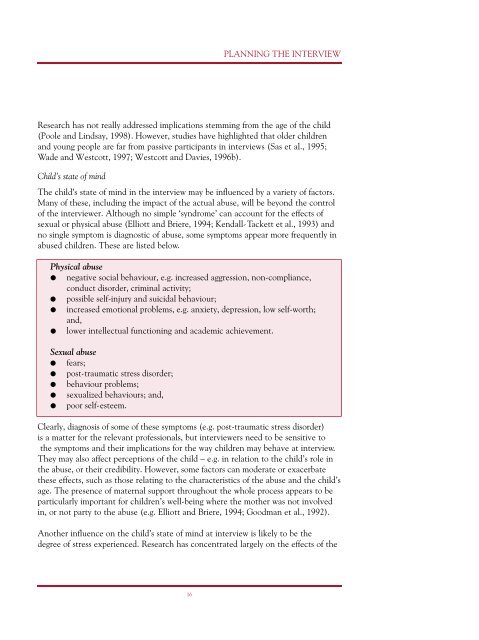Interviewing Child Witnesses under the Memorandum of Good ...
Interviewing Child Witnesses under the Memorandum of Good ...
Interviewing Child Witnesses under the Memorandum of Good ...
You also want an ePaper? Increase the reach of your titles
YUMPU automatically turns print PDFs into web optimized ePapers that Google loves.
PLANNING THE INTERVIEW<br />
Research has not really addressed implications stemming from <strong>the</strong> age <strong>of</strong> <strong>the</strong> child<br />
(Poole and Lindsay, 1998). However, studies have highlighted that older children<br />
and young people are far from passive participants in interviews (Sas et al., 1995;<br />
Wade and Westcott, 1997; Westcott and Davies, 1996b).<br />
<strong>Child</strong>’s state <strong>of</strong> mind<br />
The child’s state <strong>of</strong> mind in <strong>the</strong> interview may be influenced by a variety <strong>of</strong> factors.<br />
Many <strong>of</strong> <strong>the</strong>se, including <strong>the</strong> impact <strong>of</strong> <strong>the</strong> actual abuse, will be beyond <strong>the</strong> control<br />
<strong>of</strong> <strong>the</strong> interviewer. Although no simple ‘syndrome’ can account for <strong>the</strong> effects <strong>of</strong><br />
sexual or physical abuse (Elliott and Briere, 1994; Kendall-Tackett et al., 1993) and<br />
no single symptom is diagnostic <strong>of</strong> abuse, some symptoms appear more frequently in<br />
abused children. These are listed below.<br />
Physical abuse<br />
● negative social behaviour, e.g. increased aggression, non-compliance,<br />
conduct disorder, criminal activity;<br />
● possible self-injury and suicidal behaviour;<br />
● increased emotional problems, e.g. anxiety, depression, low self-worth;<br />
and,<br />
● lower intellectual functioning and academic achievement.<br />
Sexual abuse<br />
● fears;<br />
● post-traumatic stress disorder;<br />
● behaviour problems;<br />
● sexualized behaviours; and,<br />
● poor self-esteem.<br />
Clearly, diagnosis <strong>of</strong> some <strong>of</strong> <strong>the</strong>se symptoms (e.g. post-traumatic stress disorder)<br />
is a matter for <strong>the</strong> relevant pr<strong>of</strong>essionals, but interviewers need to be sensitive to<br />
<strong>the</strong> symptoms and <strong>the</strong>ir implications for <strong>the</strong> way children may behave at interview.<br />
They may also affect perceptions <strong>of</strong> <strong>the</strong> child – e.g. in relation to <strong>the</strong> child’s role in<br />
<strong>the</strong> abuse, or <strong>the</strong>ir credibility. However, some factors can moderate or exacerbate<br />
<strong>the</strong>se effects, such as those relating to <strong>the</strong> characteristics <strong>of</strong> <strong>the</strong> abuse and <strong>the</strong> child’s<br />
age. The presence <strong>of</strong> maternal support throughout <strong>the</strong> whole process appears to be<br />
particularly important for children’s well-being where <strong>the</strong> mo<strong>the</strong>r was not involved<br />
in, or not party to <strong>the</strong> abuse (e.g. Elliott and Briere, 1994; <strong>Good</strong>man et al., 1992).<br />
Ano<strong>the</strong>r influence on <strong>the</strong> child’s state <strong>of</strong> mind at interview is likely to be <strong>the</strong><br />
degree <strong>of</strong> stress experienced. Research has concentrated largely on <strong>the</strong> effects <strong>of</strong> <strong>the</strong><br />
16

















